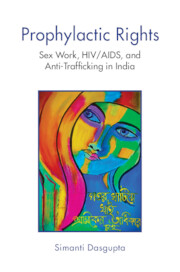Book contents
- Frontmatter
- Dedication
- Contents
- List of Figures
- Acknowledgements
- Introduction: The Karmi (Worker)—From Pesha (Prostitution) to Kaaj (Sex Work)
- 1 The Laboring Gatar: The Body between Suffering and Risk
- 2 Condom-wallis (Condom Sellers) and Condom Narratives
- 3 The Politics of Victimhood: Pachar and Trafficking
- 4 Mela, Immobility, and Imperial Feminism
- Epilogue: Another Virus, Another Lockdown
- Bibliography
- Index
Epilogue: Another Virus, Another Lockdown
Published online by Cambridge University Press: 31 May 2024
- Frontmatter
- Dedication
- Contents
- List of Figures
- Acknowledgements
- Introduction: The Karmi (Worker)—From Pesha (Prostitution) to Kaaj (Sex Work)
- 1 The Laboring Gatar: The Body between Suffering and Risk
- 2 Condom-wallis (Condom Sellers) and Condom Narratives
- 3 The Politics of Victimhood: Pachar and Trafficking
- 4 Mela, Immobility, and Imperial Feminism
- Epilogue: Another Virus, Another Lockdown
- Bibliography
- Index
Summary
We have always been under lockdown. Previously it was the social lockdown. Then it was the HIV lockdown. And, now it is the Corona lockdown.
—Member of DurbarSurely this is not how I, or the women I worked with, had envisioned the conclusion. How does one begin to recalibrate lives now bracketed between two viruses? Albeit CoV-2 is not HIV, the intimate familiarity with another global contagion understandably generated a blasé attitude, as it happened in the early days of the epidemic in Sonagachi. With the closing of national borders, as though the virus too would respect them, my relationship with Sonagachi and the didis abruptly and solely devolved into the ecosphere of WhatsApp. While I was petulantly transitioning to “working from home,” they tenderly reminded me that “it's not so bad after all, we have been doing this all our lives.”
India announced a two-week-long nationwide lockdown beginning on March 22, 2020. The sex workers, like others, were used to bandhs (strikes), so the lockdown simply seemed another version of everyday life on pause. However, this time it was not the usual strike to protest a hike in fuel prices or a policy imposed on the state by the central government. Most importantly, bandhs have usually been a windfall for Sonagachi. Typically, around late afternoon, the bandh's grip loosened, and customers – from in and outside Kolkata who attended the political rally – began pouring into Sonagachi. The talabandi (lockdown), however, defied the hours and stared the women in the face with desolate streets and a troubling silence.
Everyone had heard about the indomitable creep of the “corona” but few paid attention to this respiratory virus that was gripping the globe. When Basu inquired, Kohinoor Begum explained:
I hear about it every day. But little did I know that your corona erokom nachabey [will be this much of trouble]. We survive using our bodies. When I heard about that corona, how would I know whether we eat it or use it to oil our hair?
The scenario began changing drastically on March 24: a police barricade was set up at the entrance to Sonagachi. The police were not just surveillance agents; the barricade was undoubtedly the cordon sanitaire.
- Type
- Chapter
- Information
- Prophylactic RightsSex Work, HIV/AIDS, and Anti-Trafficking in India, pp. 250 - 258Publisher: Cambridge University PressPrint publication year: 2024



